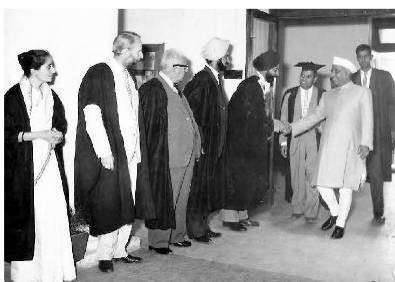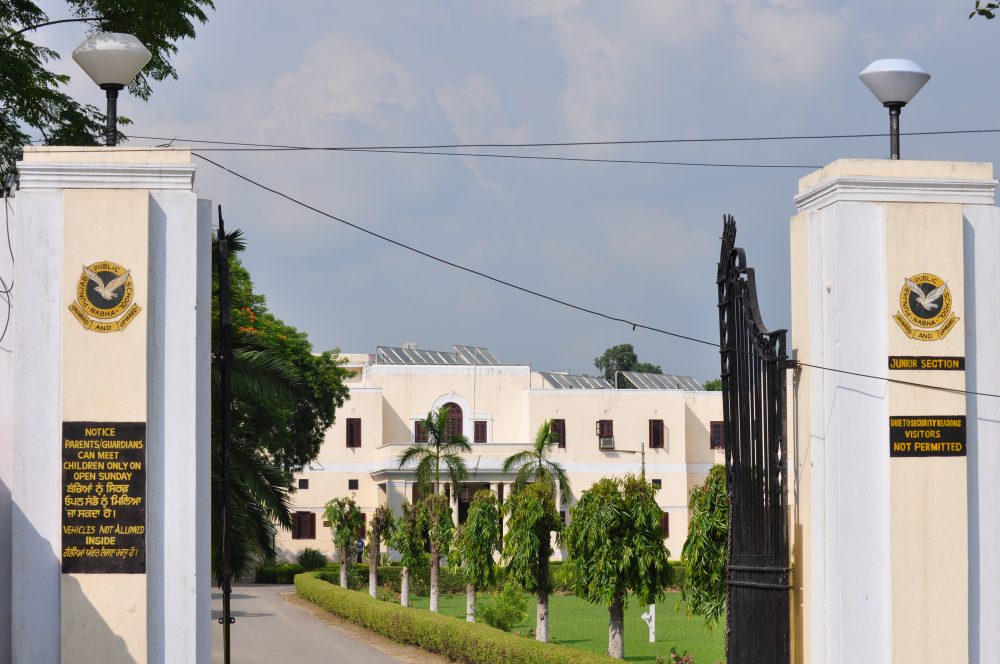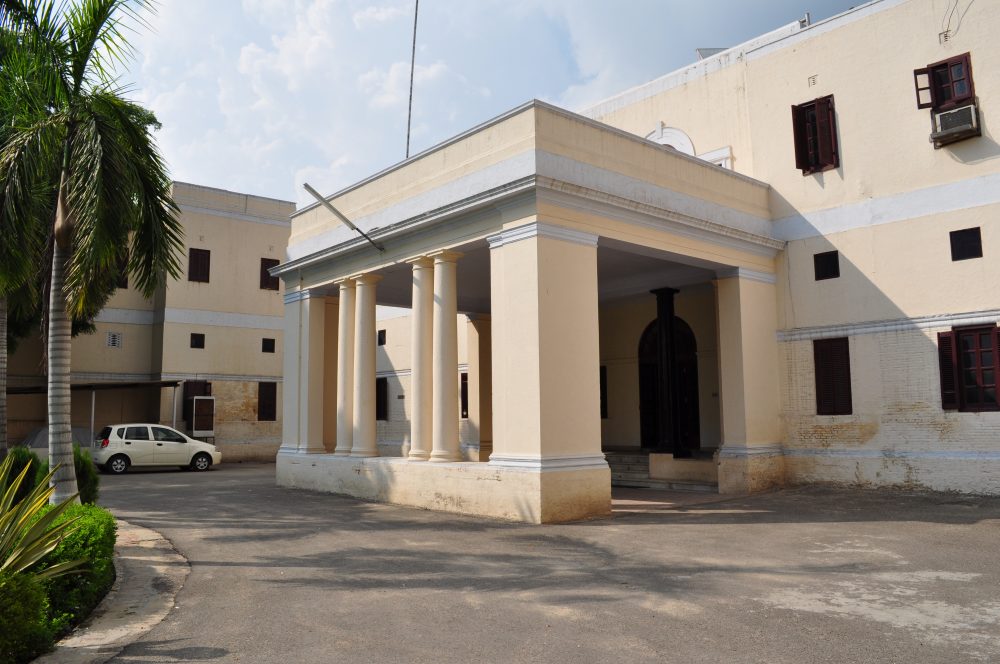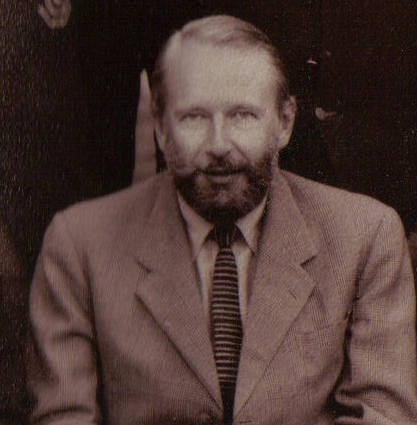
Michael Henry Dodsworth Vodden
(The English Teacher sent by the British Council to The Punjab Public School, who gave us our own original School Song to be proud of!)
Ten years after Mr Vodden joined The PPS and eight years after he had left the School, Mr J K Kate would remark:
“If I am ever asked to write the early history of the school, I shall mention three dates of outstanding importance. The first, 14th April, 1960, when the school actually started functioning; 11th April 1961, when Dr. Rajendra Prasad, President of India, formally inaugurated the school; and 13th March, 1962, when Mr M.H.D. Vodden arrived in Nabha to work as a teacher of English under the aegis of British Council.”
(From the School Chronicles and records)
- March 13, 1962 saw the arrival of a man who was to play a very important role in The PPS. Vodden had come from England after Mr.Kate had personally requested the British Council to depute an English teacher to cater to the need of improving spoken and written English in the school. So when the Voddens arrived, the entire school welcomed them with open arms, particularly Emma and Sarah, his adorable twin daughters.
- He was the teacher most admired by Mr JK Kate for bringing new ideas into The PPS on English teaching for non- English students and on handling children in a boarding school. He is also credited with authoring “The School Song” when PPS was an all-boys school.
- When Senior Master Surjit Singh retired in May 1964, Vodden succeeded him to the post of Senior Master for a short period.
From left, Miss GB Malkani, Michael Vodden, SC Cowell, GS Punia (bursar), Dr Surjit Singh(SM), Mr JK Kate with YB Chavan, Defence Minister(1961) followed by MN Tankha. The team that laid the Foundations of The Punjab Public School, Nabha
- A farewell party was organized for Mr. Vodden in the month of December, 1964.
- Mr Vodden conducted a seminar for the teachers in English in the second week of the December.
- Mr. Vodden had made teaching of English in India his special field of research. He summarized his findings and suggestions in the following seven points:
- Teach beginners a nucleus of structure and vocabulary
- Teach structures which are troublesome because they are liable to incorrect and unacceptable usage
- Observe faults and take steps to remedy them
- Give the pupils opportunity for free oral expression in English even at a stage when they will make mistakes.
- Teach the pupils to comprehend precisely what they hear and read
- Teach the pupils to think and express themselves accurately and logically.
- Help the pupils positively to enjoy reading and writing.
- Arthur Vivian THOMAS, Esq., Senior Experimental Officer, Forest Products Research………
- …..Joseph George TURNER, Esq., General Manager, Suprema Poultry Farmers (Western) Ltd.
- Joseph Gordon TURVEY, Esq., lately Senior Field Secretary, National Association of Boys’ Clubs.
- Elijah TWIGGER, Esq., B.E.M., J.P., Chairman, Coventry, Nuneaton and District War Pensions
- Committee.
- Miss Agnes Mary UNSWORTH, Principal, Newsham Drive Women’s Centre, Liverpool.
- John Joseph VICKERSTAFF, Esq. For political and public services in the County of Durham.
- Irene Agnes, Mrs. CAUSABON-VINCENT, Regional Civil Defence Organiser, Kent, Women’s
- Voluntary Service.
- Michael Henry Dodsworth VODDEN, Esq., lately Master at Punjab School, Nabha, India, British Council.
- Miss Alice Mary WALKER, General Secretary for England, Girl Guides Association.
MR. VODDEN‟S DEPARTURE AND SEMINAR ON TEACHING OF ENGLISH
Interestingly Mr Vodden felt that the role of one’s mother-tongue was extremely important for the child to learn English.He felt,“Mother tongue is a device available for the use of the teacher of English. It is not a plague to be avoided at all costs.”
Mr.JK Kate, in his article on Mr. Vodden showered praise on him for his contribution to the school. He lauded him for his approach to the teaching of English and thanked him for his greatest gift to the School – the School Song. Mr.Kate expressed his deep admiration for Mr.Vodden in the following words:
“There are great men in whose presence we feel an overwhelming sense of smallness. There are greater men who have the gift of making us feel that we are not without potentialities of greatness. One such was Mr Vodden”.
___________________________________________________________________________________________________________________________________
A Tribute to Mr. Vodden
J.K. Kate
If I am ever asked to write the early history of the school, I shall mention three dates as being of outstanding importance. The first, 14th April 1960, when the school actually started functioning; the second 11th April, when Dr. Rajendra Prasad, the Late President of India, formally inaugurated the school; and the 13th of March, 1962 when Mr. M.H.D. Vodden arrived in Nabha to work as a teacher of English for two and a half years.
When we approached the British Council with a request to lend us the services of an Englishman to teach English in the Senior School, we hardly expected to get a man whose impact on the life of the school would be so far reaching and whose contribution to its life would be so unique as Mr. Vodden’s has been.
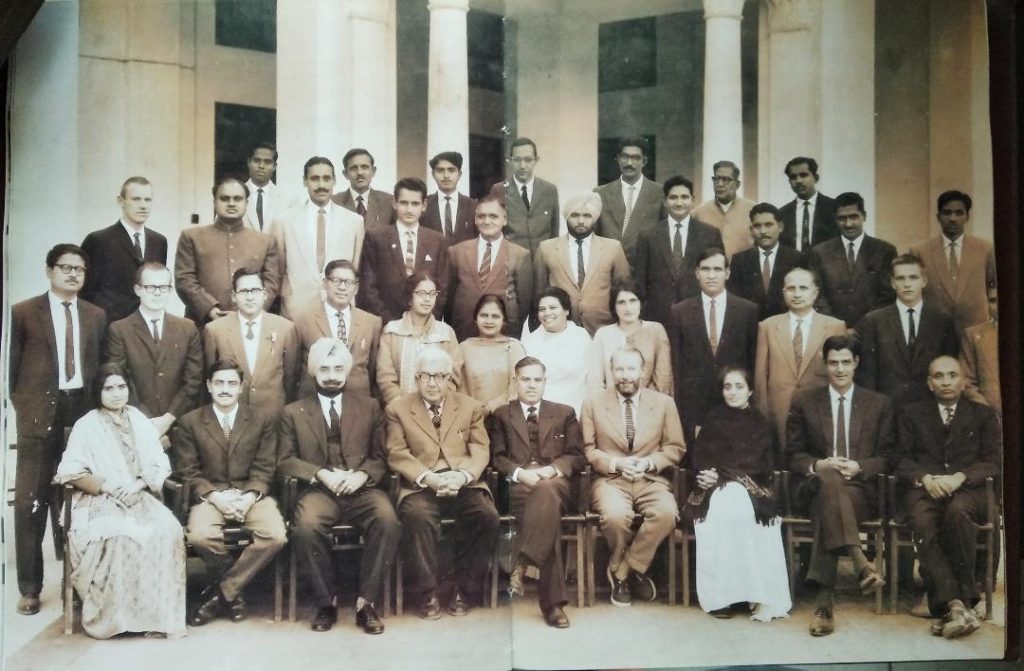
The staff (early1960s) that gave PPS such a sound base that it has withstood ups and downs in the decades that followed. Mr JK Kate and Mr Vodden are in the centre (sitting row)
From what I have come to know of Mr. Vodden, I can say that his first love is India, his second is teaching. In Nabha he found both and that is why, I think, he was able to give his best to the school.
His approach to the teaching of English is an entirely new one, one which has proved very effective. Since we do not insist on any knowledge of English on the part of a boy at the time of his admission, we get quite a few boys in class V, which is our lowest class, from Hindi and Punjabi medium schools. These boys don’t know the ABC- of English when they come to us. We are expected to prepare them for the Indian School Certificate Examination in seven years. Thus the problem of teaching English in our school is more difficult than it is in other preparatory or Public Schools where boys start learning English at the age of five. We have had, therefore, to devise ways and means of solving this problem.
In addition to taking senior classes, Mr. Vodden, devoted most of his time to this problem. The English syllabus he has left with us covers all the problems that generally face us. Having had to confront these problems himself, he has been able to plan a syllabus that is an answer to all of them. It has proved to be a boon to all my teachers of English.
As a teacher Mr. Vodden was simply superb. The boys thoroughly enjoyed his lessons, which invariably opened up new spheres of interest for them.
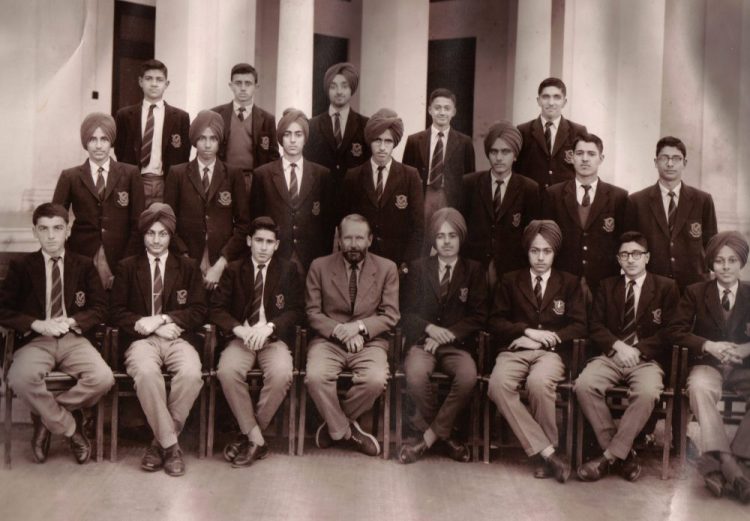
With class of 1964:Col Treman Dhillon (B-35), Head Boy on his left and Dr.Ishpal Ghai (J-61, President’s Gold Medal winner and first PPS student to get into AIIMS) on his right; Tej Kumar Sapru (S-42, Lt Gen-Retd) is seated second from right; Gurinder Dhanoa( S-9, First IPS officer from the PPS, Security Advisor to PM of Mauritius) is seated second from left; Air Vice Marshal RS Sandhu in second from left in first row standing. Lots of officers and navy engineers in the class.
His term with us was to expire at the end of May 1964, but the class, which he had been teaching since his arrival in 1962, was to sit for the Indian School Certificate Examination in Dec. 1964. I therefore requested him, with the consent of the British council, to extend his stay to December so that he could see his class through their final examination. He readily agreed to do so, though it meant a separation from his family. During this term he also worked as Senior Master. The help and guidance he gave to all the teachers in planning their lessons, setting their papers, correcting home-work and so on has resulted in marked improvement in our teaching standards.
Apart from his contribution in the field of teaching, his creative approach and his sensitiveness to the needs of children has brought about a very close relationship between the staff and boys. He was one of the most popular teachers and the boys simply loved him. In the school building, in the boarding-house, on the playgrounds -he was seen surrounded by boys every where. On Sundays his house was a haven where everyone felt himself welcome. The boys would come to borrow books, play records, and use tape-recorder or his film projector. Because of his sympathetic and genuine interest in every one’s problems and troubles, those who went to him invariably came away feeling greatly benefitted and relieved.
He took an active part in organising the School Council and participated in all its meetings. The frankness with which the boys spoke at the meetings of the council was largely due to the encouragement they got from him. The council meetings have proved very useful. It was his idea to have representatives from the junior school on the council and our experience has proved that was indeed a wise step.
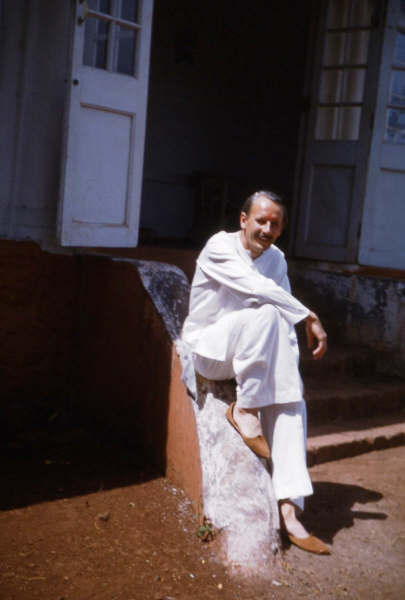
Mr.Michael Vodden on the stairs at the back of the Junior School leading to his accomodation
Mr. Vodden has given many things to the school but one, which every member of the school community will remember forever, is the School Song.
We were all happy to hear that immediately after his return to England from Nabha, he was awarded the M.B.E. by Her Majesty’s Government. Seldom could an award have been so richly deserved. I had come to rely on Mr. Vodden so much in such matters as the selection of staff, disciplinary problems of the school, and the introduction of new ideas both within and outside the classrooms that I miss him very much. He had adjusted himself to the conditions in this country and identified himself so much with the school that for all of us he ceased to be a foreigner. This, I think, is the greatest tribute I could pay him: He was a great man in whose presence, instead of being overwhelmed, we felt our own potentialities of greatness.
_________________________________________________________________________________________________________________________________________
Michael Vodden Awarded the M.B.E. by the Queen of England(1965).:
Immediately on his return to England, Mr Michael Vodden’s services were recognised by the British Government which honoured him with the award of MBE for his services in The PPS.
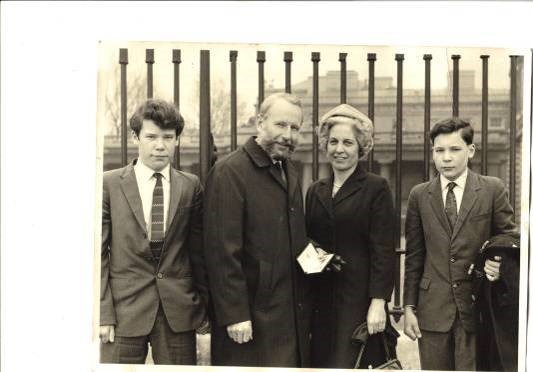
Michael Vodden outside Buckingham Palace gates with wife and sons after being honoured with MBE
Christopher Vodden found the attached photograph, which was taken outside Buckingham Palace on the day of his father’s investiture.
BELOW IS COPY OF THE LIST OF MBE AWARDEES 1965, Micheal Henry Dodsworth Vodden’s name has been made bold.
SUPPLEMENT TO THE LONDON GAZETTE, IST JANUARY 1965
(This write up is by Roger Miall ,a VSO teacher from UK. He served in Junior School during the period 1962-63. He wrote this piece on my request before Golden Jubilee of the School. I received it via email and below is a reproduction of his email to me- Dr Jashanjot (S-52))
Thursday, 11th June 2009.
Dear Jashanjot,
Please find attached the piece I have written about Michael, with input from his children, Lila Bhan (nee Kak, former teacher at PPS) and Mike Binnie, who taught at Patiala in the early 1960s. Having read JK Kate’s excellent tribute to Michael all those years ago, I have tried not to duplicate but to tell the story of MV’s life before and after his time at Nabha.
You will see from my piece that Michael was awarded the MBE for his work at PPS and went to Buckingham Palace to receive this honour from the Queen. His family are currently hunting for the photographs which were taken at Buckingham Palace and, if they find them, I shall forward them in due course. It would be nice to include one in the book.
Is it your intention to print all of this in The Eagle, or save it for the coffee table book? My suggestion is to print JK’s tribute in the forthcoming edition of The Eagle and save the attached for the book so you have something that not everyone has read.
Lastly, if you can spare copies of the book for Michael’s five children, I know they would love to receive them. They have enjoyed the experience of learning what he did in India and going through old family records. It is a pity that he and Vera died comparatively young.
Warm regards,
Roger
____________________________________________________________________________________________________________________________________________
Michael Vodden
(1921 – 1990)
By Roger Miall
Michael Vodden had a wonderful capacity for friendship, regardless of who you were. Thus during the time he taught at Nabha from March 1962 to December 1964 he became very popular with everyone at PPS and those in the local community. He spoke quietly, never raising his voice in class, and commanded natural respect from all he came in contact with. He hated pomposity and was always happy talking to interesting people in Nabha’s bazaar as he loved India.
In recognition of his excellent work at PPS he was awarded an MBE. At first he thought about not accepting it as he felt he had just been doing his job and considered he had done nothing spectacular. However Michael, his wife Vera, and their elder twins, Christopher and Paul, duly went to Buckingham Palace in 1964 to receive his honour from the Queen. When she was pinning the medal on him, there was some difficulty so, to relieve the embarrassment, Michael started to talk to Her Majesty and soon she was giggling. Vera’s comment was “Typical – charming all the women; he is even chatting up the Queen!”
Michael Henry Dodsworth Vodden came from a strict Edwardian family and grew up in East Yorkshire. His father was a vicar in The Church of England and in due course was appointed as Bishop of Hull. Michael went to Repton public school and was head boy in his last term. He was an excellent squash player, cricketer, won medals at rifle shooting at Bisley, the national shooting centre, and always tried to do things to the very best of his ability.
He won a place at Exeter College, Oxford, but World War II intervened and he joined the British Army. Michael fought in North Africa and in Italy where he came to love the Italian language. Thus, on returning to England in 1945, he decided to read Italian at Oxford. He was also disillusioned by war, over time became a pacifist, and joined The Society of Friends (commonly called Quakers).
When on vacation from university at his parents’ house in Yorkshire, he met an attractive girl in the First Aid Nursing Yeomanry (popularly known as FANY). It was love at first sight for both and Vera and Michael got married in September 1948. Their twin sons, Christopher and Paul were born the next summer, later to be followed by William, and then twin girls, Emma and Sarah, who were just 2 ½ when they came to Nabha. William, not being a twin, soon adopted Matti, a puppy of 57 varieties and in the evenings we used to take the dog for walks along the canal near the Junior School and throw sticks into the fast flowing water for Matti to retrieve.
Michael’s first posting with The British Council was to Mumbai and he soon fell in love with India. He learnt to speak Hindi, enjoyed the culture and above all the people he met. After a while Michael became restive at being stuck behind a desk. His love of languages and literature found its proper outlet when he became head of the language department at St. Peter’s State School at Panchghani in Maharashtra during the 1950s.
Michael enjoyed sharing his love of poetry and literature with others. He encouraged creative writing and students to use their imagination when writing about what interested them most. He believed that grammar and spelling should not be allowed to get in the way of expressing oneself, and he was reluctant to use a red pen where to do so might inhibit a boy’s imaginative writing.
Five months after the Voddens arrived at Nabha, Michael and William met me at Palam Airport. I was the first of what turned out to be a number of VSO volunteers to teach at PPS during the 1960s. They and all the teachers made me most welcome, and Michael soon taught me the basics of how to teach Class VIA. (I had only left boarding school in England the month before and, at 18, was hardly older than some of the boys in the Senior School.)
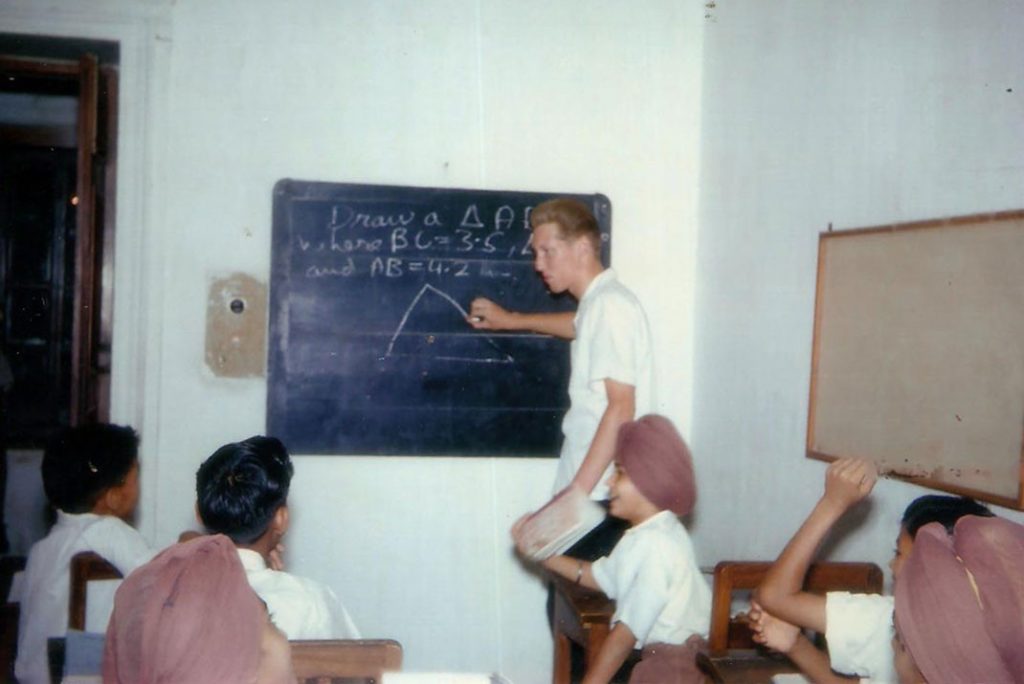
Mr.Roger Miall, the author taking a class in school.He was only 18 years when he came to the School.
I recall that often a twinkle would come in Michael’s eye and, with gentle humour, he would suggest where I should also best direct my energies in the Senior School. Sports were a weekday activity, but at weekends we started swimming in the canal (Rohti), going for rambles through the woods where we “discovered” the Maharajah’s garage full of vintage cars, and the tanks where Nabha’s army elephants once bathed.
Kate and Vodden would spend hours in the evenings talking about the running of the school and teaching. It was even known for Mrs. Kate to send Gudi (Jyoti) or Kalu (Vilas) down to the front door of the Junior School where JK and Michael were still talking in the car hours after they had arrived, and tell them that supper was getting cold. Michael privately told me that, whilst these conversations in the car were very worthwhile, the headmaster would sometimes get so animated that he would completely ignore where he was driving and they were lucky if they got round the only two bends between the Senior and Junior Schools.
It was through Michael and my getting to know the Peace Corps volunteers working on community development nearby that Dick Pine helped set up a poultry unit with 300 day old chicks outside the Junior School.
Lila Kak (now Bhan) and her family very kindly invited the Voddens, Mike Binnie, who was teaching in Patiala, and his family, and me to their summer home in the Kashmir hills in July 1963. We camped in Pundit Kak’s orchard and were regularly woken early in the mornings by herds of huge goats passing our tents. Michael once found himself facing one of these monsters whilst sitting on a toilet in the orchard. At other times he led fishing trips and swimming in the Dal Lake. The Kak family looked after us marvellously well and took us for picnics in interesting locations.
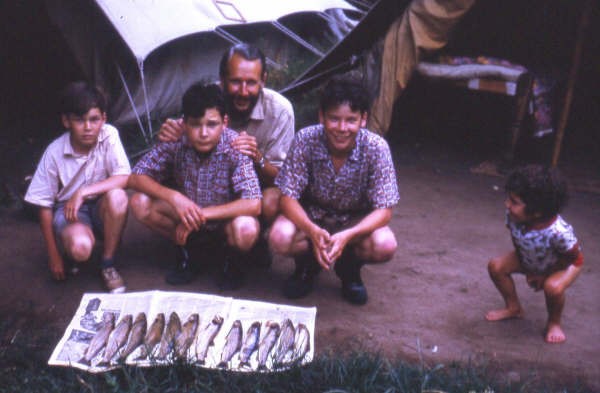
Family fishing in Kashmir whilst staying with the Kaks in July 1963
When Michael Vodden left Nabha in December 1964 he went home to Yorkshire where he studied at Leeds University for two years and wrote several educational books. These include:-
1.New English Workbooks: book 7 by Vodden and Ridout. 1966.
2.Rhythm and Intonation. 1967.
3.The Teaching of English as a Foreign Language. 1970.
1967 saw Michael Vodden based in The British Council office in Kolkata running courses and seminars for post graduate students specialising in Teaching English as a Foreign Language (TEFL). This was his last posting in his beloved India.
Whilst on leave in the UK in the summer of 1970, Michael started having blackouts. Fortunately, his condition was correctly diagnosed and he was fitted with one of the early pacemakers. However, he was advised not to return to India as there was no support for such patients there at that time.
Michael next turned his hand to teaching in his native Yorkshire. The local authorities were having difficulty recruiting someone to teach “traveller” children, as they were seen as dirty and marginalised members of society. Michael loved it and the only drawback about the job was the lice. He had to strip off every evening and put his teaching clothes in an airtight bag to be washed. He did not mind.
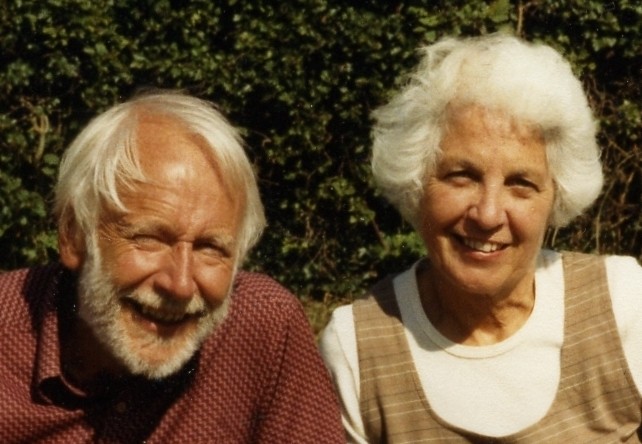
Michael and Vera Vodden in later years.
With regret Michael and Vera separated in 1972, though they always remained on friendly terms.
Michael found a new partner, Valerie, and they were together for the rest of his life. They set up a children’s book shop in Beverley, East Yorkshire, which was popular but not commercially successful.
In the late ‘70s he became a disciple of Bhagwan Shri Rajneesh and took to wearing maroon clothes. He got rid of all his worldly possessions, except for his Sony Walkman on which he listened to Bhagwan’s teachings, which he likened to those of Christ. He also started visiting long term offenders in prison.
Some of Michael’s happiest times in the mid ‘80s were when he and Valerie became summer caretakers of William Wordsworth’s former home, Dove Cottage, near Grasmere in the Lake District. There was little or no pay for this job and the cottage is very small and Spartan, but this all had great appeal to Michael as he knew Wordsworth’s poems well. Whilst in Grasmere, they befriended a family and Michael particularly connected with their eight years old son, Rowan, who had a terminal disease. Michael was struck by Rowan’s candour about death and it made a great impact on him. Michael had a great ability to see people as individuals and to make friends with folk of all ages and social standing. He often talked about his chance meetings with interesting people. No doubt they felt the same about him.
In early May 1990 Michael Vodden was not feeling well and it was discovered that he had liver cancer. He died six weeks later with peace and dignity surrounded by Valerie, her son, his daughters, Sarah and Emma, and his three months old grandson, Joseph. Vera died ten weeks later to the hour also of cancer.
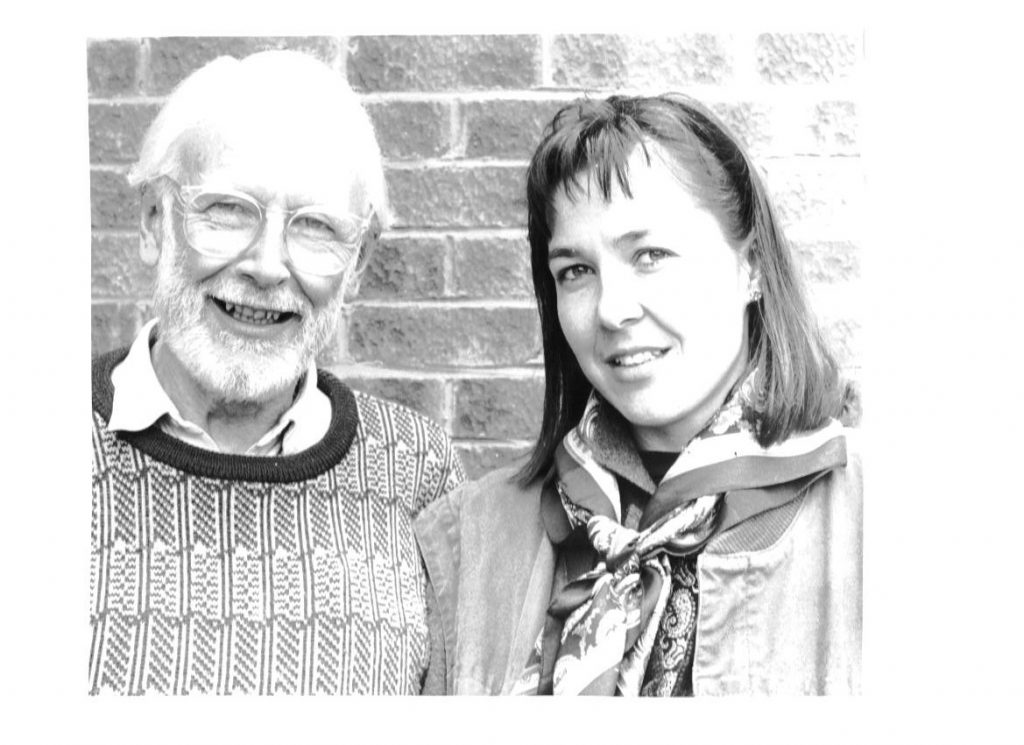
Michael and his daughter, Sarah Baskerville, shortly before he died.
The Vodden children, who were raised in India, now live in the UK and the USA and have families of their own. My thanks to them for much of the above information about Michael Vodden’s later years, and for the photographs.
_______________________________________________________________________________________________________________________________________
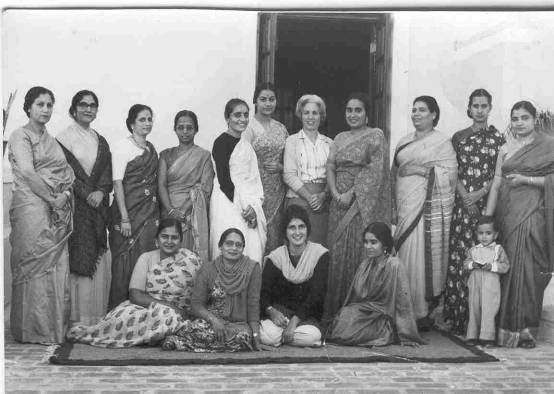
Mrs Vodden standing in center with ladies of the Ladies Club of the School
___________________________________________________________________________________________________________________________________________
The School Song
In a special function organized on January 28th 1963, Mr Terry, Principal of Thapar Polytechnic Institure (now Thapar University of Technology, Patiala) unveiled the School Song composed by Mr Michael Vodden and the tune was set by none other than Mr Terry himself using the School Piano. Mr Vodden mentioned that when he sat down to write the School song, he started with the idea of co-operative service, beginning with the individual and then widening it to School, country and ultimately the entire Mankind.
The School Song
While we are boys in School,
We learn our lives to mould
By learning how ourselves to rule
Alert and self-controlled.
Moving ever onwards inspired by glories past
We “ll build a worthy future striving upwards to the last.
In Class and House and School
Alone we are sure to fail,
We must our many talents poolUnited we‟ll prevail.
Moving ever onwards inspired by glories past
We‟ll build a worthy future striving upwards to the last.
In work as well as play
Our friends are close at hand,
With all of them to help we may
Uplift our Motherland.
Moving ever onwards inspired by glories past
We‟ll build a worthy future striving upwards to the last.
In India is our pride;
Courageous, just and true
We‟ll serve our fellows far and wide
Here and the whole world through.
Moving ever onwards inspired by glories past
We‟ll build a worthy future striving upwards to the last.
_________________________________________________________________________________________________________________________________________
Quotes:
During Vodden’s tenure corporal punishment was replaced by detentions when we had to copy pages from dictionaries or have our Diwali home weekend taken away which some of us found more onerous than other forms of punishment.
Jaspal Chatha (R-89,1966), a student of Mr Vodden
(Below are excerpts from anecdotal history of 1960s by OP Bhatnagar, Ex-Hindi and Art Teacher, colleague of Mr Vodden)
On the last working day of every academic year of the outgoing boys, there used to be highly colourful farewell party. Such parties were really grand. Class XI students were the guests of honor. They and the staff members used to turn up in fancy dress. Even the HM did. There was a prize for the fancy dress. I won it twice. There was a long session of merry making with enormous enthusiasm. “Passing the buck” had several rounds. One who was caught with the buck had to do something as per the lots. Once, Mr. Michael Vodden was asked to do something unusual. He immediately held the fore-paws of his pet dog and went about hopping and dancing with him. Somehow, from 1968 onward the farewell party lost its lustre and enthusiasm.
Debates lacked witty refutations. It was a kind of competition of mugged up speeches. In order to train the boys in debatory skills, Senior Master Mr. Vodden planned a debate which included teachers as participants. Mr. Vodden led one team and Mr. Dighe the other. They put up a great show of arguments and refutations. Mr. Dighe outsmarted everyone including Mr. Vodden. Sutlej House boy Gurinder Chhachhi (S-76,1967) also excelled. Boys got to know what real debate was like. Mr. Rajendra Sibal also made a mark.
Mr. Vodden used a set of symbols for correction work. I found them very useful. Based on his symbols, I devised my own. That made the correction work of exercise books a lot faster and more purposeful. Mr. Vodden’s contribution was immense. He was highly innovative.
________________________________________________________________________________________________________________________________________
First Impressions
(from the school Chronicle)
Michael Vodden (1962)
“What’s happened here?” I thought to myself. “It can’t be the monsoon, either this year’s or last year’s. Perhaps a water-pipe has burst.” Here was the school we had been thinking about and travelling towards for almost a month. I had imagined an impressive building, and so it was, with shapely curving turrets. I had thought there would be grass and trees about, and so there were. But what I had not foreseen that the approach to it would look more like a river than a road.
Having splashed in through the main gates, the car stopped in front of an imposing entrance. There were some steps and some men on them. They must be some of my new colleagues. Try to forget about the last four hours in the car, entertaining travel – frantic children. “How do you do?” “Yes, thank you.” “Mr. Kate is at the Junior School. “All right, then we will go there.”
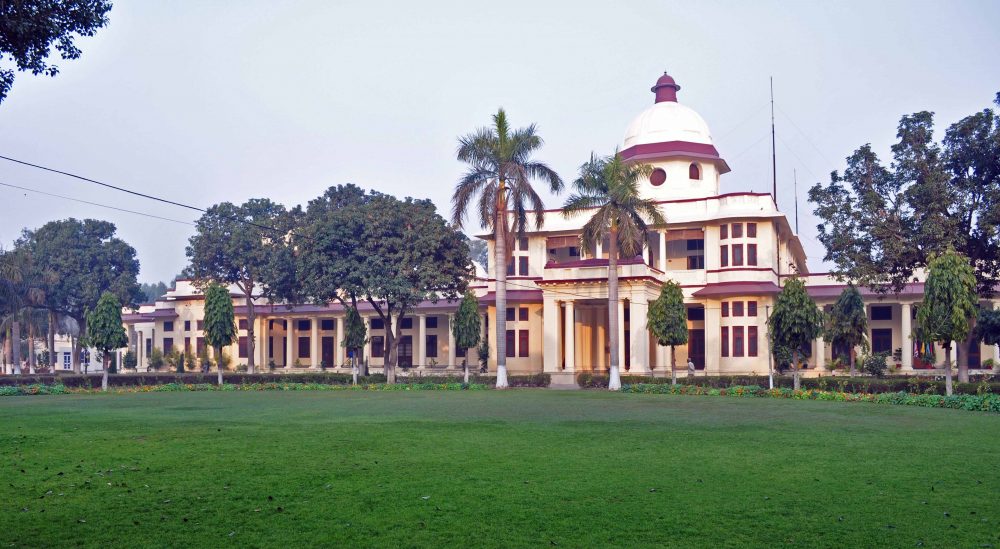 The Senior School or Kairon Block
The Senior School or Kairon Block
Another large building, but this one seems all straight lines and pillars. So, this is to be our new home. Large rooms-a big verandah- running water, and hot too! Curtains, and such lovely ones! We could not help being comfortable here.
First impressions of places are quickly forgotten. The first time you go out of a new home, it seems different on your return. When you first see it, you see it in isolation or in comparison with somewhere else. As soon as you begin to know the surroundings, it changes. It is like setting of a play in school: the props that you used last year against one lot of scenery seem to look quite different against another lot of scenery.
What have I noticed during the past three weeks as being strange? I had not thought that the countryside would be like it is. In the Sahyadris we were used to brown earth and grey rocks for half the year, and to lush greenery, splashing waterfalls, mists and dampness for the other half; cultivation in the valleys and in pockets of hills , trees grouped around the villages and scattered like blobs of green cotton-wool across the floor of the valley below. Here there are trees everywhere and masses of flowers in gardens. The trees cut us off from the vast flat distances and give shelter to a chattering bird population that is not altogether familiar. On the road to Poona I occasionally used to see hornbills with their fantastic beaks and fluttering flights, but here I can see them any evening struggling from tree to tree, their long necks anxiously outstretched. What is that noise like the twanging of an old spring, coming from the top of the tree? There it is, brown beast, long tail, dark grey head- a tree pye. Listen, there’s a call I heard in Saurashtra by the lake near Bhavnagar. “Did he do it? Did he do it?’’ and the dainty red-wattled lapwig circles over the fish ponds waiting for Pasha to go on his bustling way.
In class I am immediately baffled by all the turbans. They seem to make wearers look so much alike. Shall I ever be able to tell who is who, much less know the boys by name? And the names…… I am used to a school with twenty-seven Shahs and eighteen Patels but here there are Singhs to the power of two hundred. I have known Deepaks, Ashoks, Prafuls, Raheems, but now I have to listen carefully to catch Parminders, Bhupinders, Satinders and Daljeets.
Another thing is the language. In Bombay, in my first flush of enthusiasm, I embarked upon twice weekly Hindi lessons, thinking that the national language would help me to get to know the country and its people. When I tried to use it, I was sadly disillusioned, and only once, when I spent a fortnight in Madhya Pardesh, did I regain anything of my earlier keenness. Not only could I live my daily life in English but I was even able to use it in order to penetrate a fair way under the skin of India. Why spend time on Hindi? Here I find that Hindi really is spoken, and that English is much less understood, in the shops, for example, and by servants. Can I feel that old enthusiasm returning? Are my own endeavours to teach English going to swamp any efforts I may make to take up Hindi again?
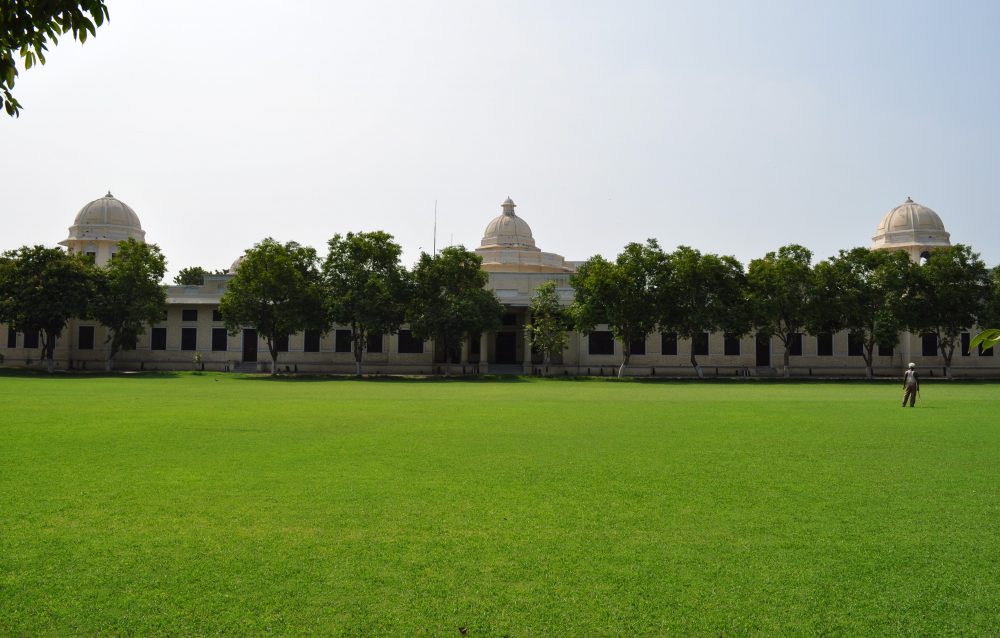
Beautiful view of the main building (The Kairon Block) as seen from behind. The ground has been named ‘Headmaster’s Green’
First impressions are bound to register what is strange but they do also register what is familiar. When we went to Panchgani, we were touched by the kindness that everybody showed us and by the efforts which people made so that we should feel at home. The same thing has happened again: within minutes of our arrival we had noticed things that told us how much thought and effort had been put into preparing for our arrival. Every day since has brought fresh evidence of the general wish to welcome us. Already those bonds of friendship are being forged which will bind us to the boys and staff of the Punjab Public School.
(Compiled by Dr Jashanjot S,52.1967)
